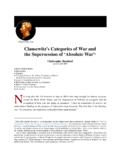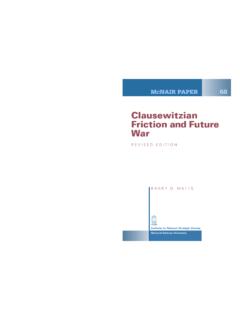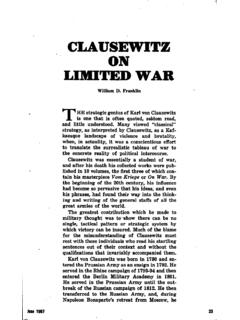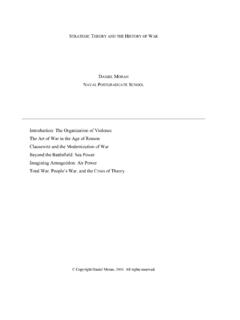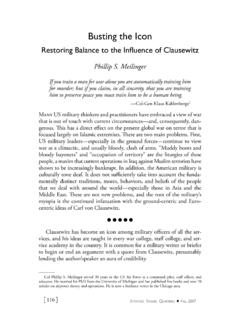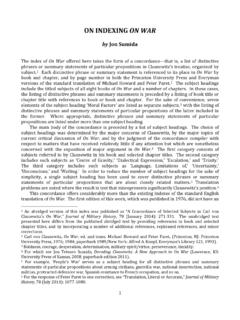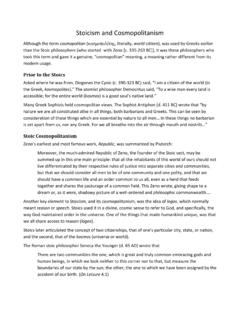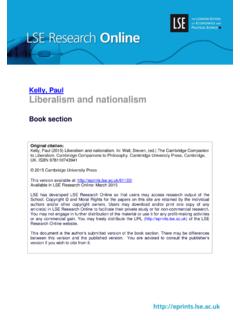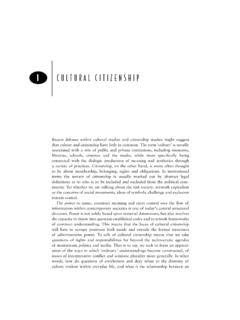Transcription of Clausewitz and the Ethics of Armed Force: Five Propositions
1 Journal of Military Ethics (2003) (2(3)): 213 /226. Editor's note: This special column of the Journal of Military Ethics highlights important historical contributions to the Ethics of war, peacemaking and military affairs. In this issue Director of the Centre for Defence Studies, King's College London Dr. Paul Cornish considers ethical dimensions in Carl von Clausewitz ' (1780 /1831) seminal work: On War (1832). BENCHMARKS. Clausewitz and the Ethics of Armed force : five Propositions Paul Cornish Director, Centre for Defence Studies, King's College London, Strand, London WC2R 2LS, UK. Tel: /44 (0) 20 7848 2338/1433, Fax: /44 (0) 7848 2748, E-mail: The work of Carl von Clausewitz continues to provoke heated debate.
2 For some scholars, Clausewitz 's On War remains indispensable to serious thought on the resort to war in the modern period. Others, however, see Clausewitz 's work as either outdated, or a morally repellent argument for unlimited, unrestrained and brutal warfare. This essay argues not only that Clausewitz 's work continues to be relevant to discussions on the use of Armed force , but also that On War provides a framework for ethical reflection on war and its conduct. Two main preoccupations of western **. military academies and staff colleges / Clausewitz on the one hand, and the just war tradition on the other /can complement, rather than rival each other. On War creates a space for reflection on the use of Armed force , and for that reason if no other, should still be considered an important resource for contemporary students and practitioners of strategy.
3 KEYWORDS: Clausewitz , military Ethics , Armed force , just war. Problems with Clausewitz The early nineteenth-century writings of the Prussian general and military thinker Carl von Clausewitz provoke enthusiasm and contempt in equal measure. Among Clausewitz 's supporters are those who regard his seminal (and unfinished) On War as a milestone in western political philosophy. In the late 1970s the English philosopher Philip Windsor described Clausewitz 's On War as the only work of philosophic stature to have been written about war in the modern period' (Windsor 2003 Taylor & Francis DOI: 214 Paul Cornish 1977: 193). At about the same time, in an introductory essay to what has since become the standard edition of On War , Bernard Brodie wrote His is not simply the greatest but the only truly great book on war' (Brodie 1976: 53).
4 Before altering his opinion of Clausewitz rather fundamentally, Martin Van Creveld gushingly described On War as the eternal treasure of the human spirit' (Van Creveld 1986: 48). More recently, the strategist Colin Gray has taken up the cause of Clausewitz , describing On War as the gold standard for general strategic theory'. and its author's insights as intellectually inescapable' (Gray 1999: 112). Critics of Clausewitz fall largely into two camps. First, there are those who regard Clausewitz 's work as morally repellent, as advocacy (whether explicitly or implicitly) of unlimited, unrestrained brutal warfare. The twentieth-century British strategist, Basil Liddell Hart, notoriously described Clausewitz as the Mahdi of mass and mutual massacre' and the source of the doctrine of absolute war'', the fight to the finish theory' (Liddell Hart 1957: 57).
5 Liddell Hart's claim (albeit later moderated) was that the effect of Clausewitz 's work on European strategic thought was to diminish the moderating and legitimising role of politics, and perhaps even to remove political restraints from the equation. For Liddell Hart and other critics who equated Clausewitz with the disproportionate and inhumane military practices witnessed during the First World War, Clausewitzian strategy was pursued with at best a diminished sense of political proportion, and encouraged the military means to consider itself an end in its own right. Taking up the theme, the British military historian John Keegan recently described Clausewitz 's work as pernicious', through its presentation of war as a value-free activity' (Keegan 1999: 42).
6 Latterly, Mary Kaldor has argued that On War has had a crowding out effect on moral reflection on war, supplanting concepts of justice, jus ad bellum , drawn from theology' (Kaldor 2001: 17), and offering a secular and state-centric rationale and legitimacy for the resort to war. Another group of critics begin from the observation that Clausewitz 's analysis was based on a very narrow, socially and historically unique experience: Napoleon's mass warfare in early nineteenth-century Europe. Furthermore, Clausewitz 's work reflected assumptions */principally regarding sovereignty and the state's monopoly prerogative on the legitimate use of Armed force */which are now more contested than accepted. For all these reasons, the claim is made that Clausewitz has too little to offer to students of early twenty-first-century international politics with its diffusion of actors, and to students (and practitioners) of modern Armed conflict where non-state Armed forces have an important role and where the political' and the military' are not simply held in a relationship */however close */but are fused into one.
7 Martin Van Creveld has been at the forefront of this critique of Clausewitz , offering the prospect of non-trinitarian' warfare ( , warfare which does not conform to Clausewitz 's Westphalian-style trinity' of people, army and govern- ment) (Van Creveld 1991). Keegan argued that Clausewitz missed the point altogether, and could not avoid doing so: Clausewitz was a man of his times, a child of the Enlightenment, a contemporary of the German Romantics, an intellectual, a practical reformer, a man of action, a critic of his society and a passionate believer in the necessity for it to change. [..] Where he failed was in seeing how deeply rooted he was in his own past, the past of a professional officer class of a centralised European Clausewitz and the Ethics of Armed force 215.
8 State. Had his mind been furnished with just one extra intellectual dimension */and it was already a very sophisticated mind indeed */he might have been able to perceive that war embraces much more than politics: that it is always an expression of culture, often a determinant of cultural forms, in some societies the culture itself (Keegan 1993: 12). As in any good debate, there are also those who question the more dogmatic interpretations of On War , of whatever persuasion. Michael Carver noted how [On War] quickly became, and has remained ever since, the strategist's Bible; and, as with the Bible, quotations can be found in it to suit all tastes and to justify conflicting opinions' (Carver 1982: 15). And in his introductory essay to the Princeton edition of On War, Michael Howard warned against reading too much into On War , or expecting more than Clausewitz intended to give: It remains the measure of his genius that, although the age for which he wrote is long since past, he can still provide so many insights relevant to a generation, the nature of whose problems he could not possibly have foreseen' (Howard 1976: 43).
9 The contention of this brief essay is that, in spite of the vehement criticism of Clausewitz as amoral (at best) and dangerously outdated, On War does indeed make valuable contributions to the debate on the morality of the use of Armed force , and for that reason if no other, should still be considered an important resource for contemporary students and practitioners of strategy. This might appear to be a particularly difficult argument to make. Clausewitz is, after all, popularly perceived to be a soldier, a state-centred realist, an historicist, a scientist, a pragmatist, a technologist, a theorist of warfare; anything but a moral philosopher. What is more, it seems clear that Clausewitz himself was unwilling to dwell for too long on such matters.
10 At one point in On War he asks whether mankind at large will gain' from the advent of people's war' and from war itself', but seems content that the answer to such questions should be left to the philosophers' ( Clausewitz [1832] 1976: 479). Yet in spite of his bloodthirsty popular image, and in spite of his own reticence in the matter of morality, several scholars have sensed an ethical dimension to Clausewitz and his work. Certainly, there is occasional evidence in On War of a moral conscience at work: Battle is the bloodiest solution. While it should not simply be considered as mutual murder [..] it is always true that the character of battle [..] is slaughter, and its price is blood. As a human being the commander will recoil from it' (ibid.)

